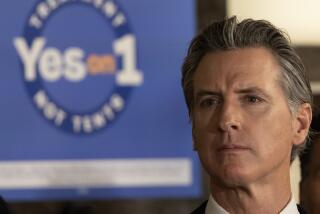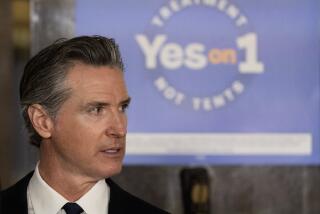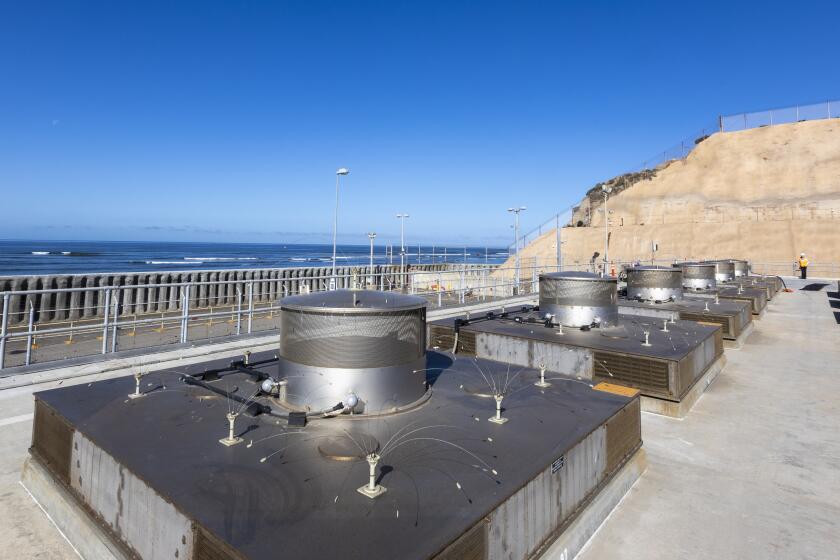Prop. 1A: the right budget fix?
Today’s topic: Would Proposition 1A help California’s broken budgeting system, or just make it worse? And what happens if the measure fails and California doesn’t get the billions of dollars in revenue from the increased sales tax, personal income tax and vehicle license fee?
Don’t understand Prop. 1A? Don’t feel bad -- it’s a mess
Point: Jean Ross
Proposition 1A would do nothing to address the fundamental cause of California’s persistent budget problems: an imbalance between the revenues raised by the state’s tax system and the cost of current programs and services. In fact, Proposition 1A would layer new costs and formulas on top of the complex web of budget rules that already severely constrain the state’s ability to balance its budget in tough economic times.
Although proponents talk about beefing up the state’s “rainy day fund,” they fail to mention that Proposition 1A would divert only half of the annual contribution to the reserve. Funds would first go to pay off amounts owed to schools and community colleges, if Proposition 1B is approved by the voters, and then permanently into an unlimited “supplemental” fund that could only be used for infrastructure -- one of the fastest-growing items in the budget -- or to repay state debt. In brief, Proposition 1A cloaks a major policy shift and a substantial new and permanent spending obligation under the guise of building a budget reserve.
Moreover, Proposition 1A would force the state to make deeper cuts in some bad budget years by requiring contributions to the reserve even in years when the state faces a deficit, would prevent the use of funds in the reserve from fully closing budget gaps in bad economic times, and would limit the state’s ability to spend existing tax dollars to restore the deep cuts made in recent budgets once economic growth bolsters state revenue collections.
California will face an $8-billion -- possibly modestly larger -- shortfall on May 20 if Proposition 1A fails. California will face an $8-billion -- possibly modestly larger -- shortfall on May 20 if Proposition 1A passes. That’s right: Proposition 1A would have no immediate impact on the size of the state’s budget deficit. While proponents have cynically employed scare tactics aimed at convincing voters that the state will fall off a fiscal cliff if Proposition 1A is not approved, the facts are simple: Proposition 1A would not affect state tax collections until Jan. 1, 2011. California does face a significant budget shortfall -- regardless of the outcome of the May election -- due to continuing weakness in the economy.
A responsible debate over California’s fiscal future would start now with a plan to address the deficit that will occur irrespective of the outcome of the election, with additional options if the voters fail to approve the “money measures” on the May 19 ballot -- Propositions 1C, 1D and 1E.
Last, but not least, Proposition 1A is wickedly complicated -- don’t take my word for it, read it yourself -- and would, similar to other recent ballot measures, undoubtedly result in unintended consequences that would further complicate California’s almost incomprehensible budget process.
The bottom line: Proposition 1A is full of false promises, will do nothing to close the state’s immediate budget gap and will only make it more difficult for California to respond to the demands of a growing, aging and changing population and the challenges faced by an increasingly competitive global economy. California deserves better.
Jean Ross is the executive director of the California Budget Project, a Sacramento-based nonprofit, nonpartisan public policy research group.
Prop. 1A is about more than just increasing state revenue
Counterpoint: Emily Rusch
California’s economy is among the 10 largest in the world, but unlike other governments, we must balance our budget each year, an especially difficult feat because tax income fluctuates wildly with the economy. Unable to print money, unless we have a reserve set aside the state is forced to sharply cut spending during recessions -- precisely the moment when enhanced public spending is most needed.
We are in a heap of trouble this year, and we do not have an adequate reserve to get us through it. Consider these examples: 27,000 teachers laid off in March, 12,300 fewer spots at the state’s public universities and cuts in our bus, rail and healthcare services, which affect millions of Californians.
We need a more robust rainy-day fund to prevent deep cuts in the future like the ones we are experiencing today. Proposition 1A would require Sacramento to save 3% of the taxes we pay each year until it has a reserve equal to 12.5% of the state’s annual income. California would be able to use those savings to get us through tough times, resulting in slightly less spending in the near term but the long-term stability the state badly needs.
Look at public transportation. Despite the benefits it provides our economy, environment and quality of life, legislators frequently cut funding for public transit services in tough budget years -- so frequently, in fact, that many transit agencies no longer budget for money from the state because they cannot count on it to be there. It would be far better for our bus and rail systems if the state supplied public transit agencies with a predictable level of funding rather than the unpredictable roller-coaster they are on today. Of course, if the moderate level of funding is not enough, public transit advocates like myself should make the case for new revenue to support services. Stability is essential for quality public transportation; the same is true for schools and many other state-funded services.
I understand that many question the need for us to vote on this at all and why politicians cannot budget well on their own. But when budget negotiations come down to the wire -- as they always do in California -- it is very difficult for legislators not to spend all available funds. Rainy-day funds have little use unless there are rules that mandate deposits and limit withdrawals. When strict rules do exist, states save more, can borrow less expensively and experience less volatile ups and downs in their budgets. Voters need to send a message to Sacramento that we must not allow California to experience such a dramatic drop in available funds for public priorities in the future.
If Proposition 1A fails, California will have far less revenue over the next four years, no question -- $16 billion, according to estimates by the Legislative Analyst’s Office -- that could have gone to help more Californians go to college, provide rail and bus service, fund critical healthcare services for millions of Californians and other programs that are already significantly underfunded.
But the short-term revenue isn’t the primary reason to vote for or against Proposition 1A. The measure’s revenue enhancements would be in effect for no more than two years, after all, and we need long-term solutions. Voters should support the initiative to ensure long-term budget stability and prevent the dramatic cuts we are seeing today.
Emily Rusch is the state director of CalPIRG, a nonprofit, nonpartisan public interest advocacy organization.
More to Read
A cure for the common opinion
Get thought-provoking perspectives with our weekly newsletter.
You may occasionally receive promotional content from the Los Angeles Times.






